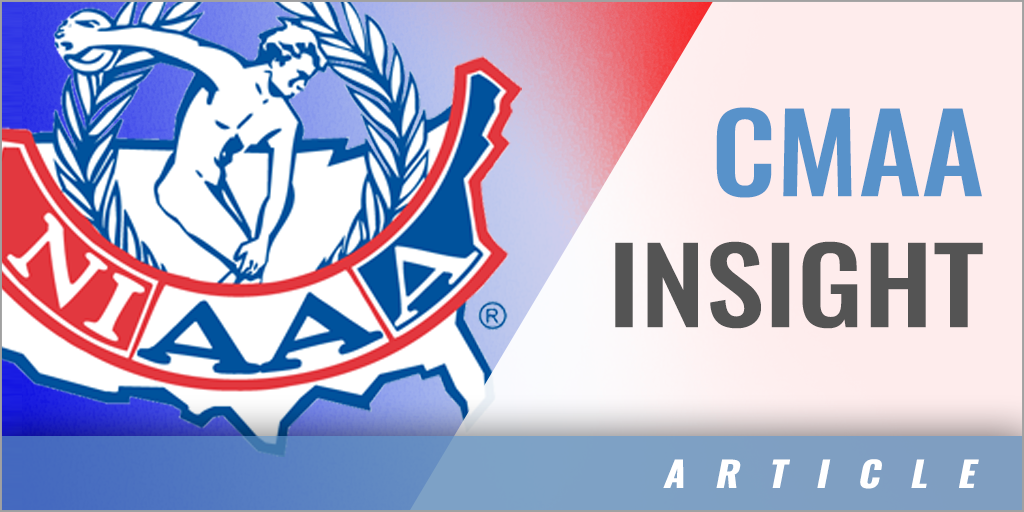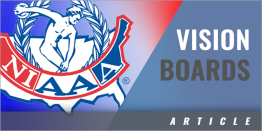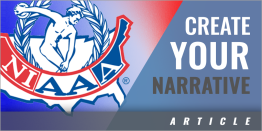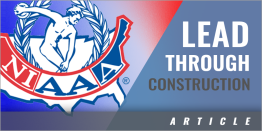|
By: Kaleb Stoppel, CMAA - Kansas, Lisa Gingras, CMAA - New Hampshire, Colin Fegeley, CMAA - North Carolina, Pete Shambo, CMAA – New York The NIAAA Certification Committee has seen a significant increase with regard to the number of members seeking CMAA certification over this past year. There are many questions that are often asked of Certification Committee members, ranging from questions about the overall process, to the LTC requirements. The most common question posed to a Certification Committee member is whether the athletic administrator should pursue an oral CMAA project or a written CMAA project. This article will provide insight into the CMAA certification process, including examples of CMAA projects that have been completed this past year to help serve as a guide to supporting the decision to pursue the CMAA designation.
The Certification Committee will provide support and guidance throughout the entire process. For the written CMAA project, once the Personal Data Form has been submitted the project will be assigned to a member of the Certification Committee. This individual is referred to as the reader of the CMAA project. The reader will contact the CMAA candidate and confirm receipt of the written project. The reader may have questions, or even require further information before proceeding, depending on the situation. The review may take several weeks, depending on a reader's availability and any necessary revisions. Remember, the Certification Committee is made up of active, full-time athletic administrators. Once the review and evaluation of the written project is complete, the candidate is notified by the reader that the project is approved, or in some cases, additional information or changes are needed. The process is very similar for those submitting an oral CMAA project. Once the Personal Data Form has been submitted, the project is assigned to a review team of members of the Certification Committee. A lead member of the review team will confirm receipt of the project. The review team may have questions about the project, or even require further information, depending on the situation. The lead reviewer will work with the candidate to complete their submitted presentation and ensure it includes all criteria for success. A date will be set for the oral presentation when a review team can be confirmed. This, too, may take as much as two weeks to arrange. Once the oral CMAA project presentation is complete, the review team will convene to assess its quality and rigor.
Successful projects include the following format: Who - Stakeholders; What - Purpose; When - Timeline; Where - Population and/or location; Why - Need; How - Implementation; Assessment and Evaluation - Supporting data; Conclusion - Impact on stakeholders and long-term effect; and finally, an indication of the Leadership Training Courses that have impacted the project and/or project development.
Written CMAA Project Journey - Dr. Kaleb Stoppel, CMAA - Olathe East High School (KS) - "Recognizing Student-Athlete Achievement During COVID-19: Planning, Organizing, and Hosting a Virtual Athletic Signing Ceremony" When all in-person school events were put on hold, and the Kansas Governor closed all school buildings across the state, Olathe East High School (KS) Assistant Principal/Athletic Director Dr. Kaleb Stoppel had to rethink how he would honor the seniors at his school who were signing to continue their academic and athletic career into the collegiate setting. Knowing the importance of honoring this great milestone, he was determined to create a safe opportunity for the student-athletes to be honored. Troubleshooting the problem, Kaleb planned a virtual athletic signing ceremony which would utilize school personnel, family members, friends and the signee. Signing ceremony participants gathered via a Zoom meeting to recognize and showcase the senior's commitment to pursue an academic degree and athletic participation at a college or university institution. Later, the recorded Zoom meeting video would be produced and shared with the community through social media. Since completion of his CAA certification, Kaleb had pursued ideas for a CMAA project. While working through the planning of this virtual athletic signing event, he realized this process would be appropriate to document for a CMAA project. Once he was committed to the CMAA project, he began documenting each step of the preparation for the virtual athletic signing ceremony, including all of the stakeholder communication, documents, and "behind the scenes" work that was being done to prepare for the event. During the planning, coordination, and facilitation of the event, Kaleb continued to collect all documentation and notes from the process and began writing the CMAA project report. There is no one way to approach a CMAA project. Kaleb chose to act on a problem he was facing, see the connection between that work and the goals and requirements of a CMAA project, and allow this experience to be documented within a written CMAA project in hopes it could assist and support other athletic administrators. Kaleb's written CMAA project can be found online at http://bit.ly/virtualathleticsigningcmaaproject or by scanning the below QR code.
Written CMAA Project Journey - Lisa Gingras, CMAA - Nashua School District (NH) - "Nashua Athletics Hall of Fame: The Rebirth after Nearly Twenty Years" Lisa Gingras, Director of Athletics and Wellness for the Nashua School District (NH) remembers sitting to take her CAA exam in 2017 and being told by the test administrator to start working on CMAA projects immediately, to continue professional growth, and work toward the next certification level. The test administrator mentioned that each of the athletic administrators sitting for the CAA exam that day had at least a dozen projects sitting on their desks, in their offices, or computers at that very moment. All they had to do is decide which one was worthy of the CMAA prestige. Additionally, other advice Lisa remembers receiving from colleagues reminded her that each CMAA is unique and is about the process of the endeavor and not necessarily the end product. Lisa took this advice to heart and began to look around and think about things she was not only already doing, but was also something she was passionate about, to determine what would be an appropriate and worthwhile CMAA project pursuit. As Lisa was sifting through the multitude of various projects and tasks she had in front of her, searching for an appropriate CMAA project, she found herself reflecting most about her unique pursuits and projects. This includes past and present, where the impact of her efforts onto her school and community would be felt long beyond her retirement one day. Leaving a positive legacy has always been something important to Lisa in all she does, so the pursuit of the CMAA project was no different - she wanted to leave a lasting, positive legacy through her work. When Lisa reviewed various projects, and their impact on the community, Lisa was drawn to resurrecting the Nashua Athletics Hall of Fame. Nashua High School inducted ten hall of fame classes from 1991 to 2000, but had not inducted others since. In the fall of 2004, the Nashua School District transitioned from having a sole high school, Nashua High School, to having two high schools - Nashua High School North and Nashua High School South. In 2018, Lisa brought together key stakeholders and began the work to recognize individuals from the original Nashua High School, as well as individuals from Nashua High School North and Nashua High School South. Bringing back regular inductions into the Nashua Athletics Hall of Fame was very important to the Nashua schools and community. As Lisa began organizing her CMAA project report, she found the project format document and the Keys to Success document she received from the NIAAA. These documents were the most influential documents that would guide her through the process of writing and final submission of the project. Lisa began with a word document and started a list of ideas and notes about possible evidence and content within each section of her CMAA project report. When deciding whether to present her project in a written or oral format, Lisa felt this was all dependent on personal preference, and ultimately chose the written format so she could revise and edit the project ongoing throughout the process. Despite all the planning, work, and writing, there was no feeling more gratifying than receiving approval of her CMAA project and that she had officially obtained CMAA certification. In addition to the pride of earning the CMAA certification, Lisa hoped her project would help other athletic administrators with a model to organize their own CMAA project. Lisa's CMAA project was particularly noteworthy, as it was the 1,000th CMAA certification awarded by the NIAAA since the designation had been developed. Lisa's written CMAA project can be found online at http://bit.ly/nashuahalloffamecmaaproject or by scanning the below QR code.
Oral CMAA Project Journey - Colin Fegeley, CMAA - Green Level High School (NC) - "Opening a New High School - Athletic Programming, Identity, and Culture" "There is no time like the present to focus your efforts on obtaining your CMAA certification." This is what Colin Fegeley, Green Level High School athletic director, told himself as he was putting the finishing touches on his oral CMAA presentation in January of 2020. For Colin, the oral presentation was the only way to go. Colin had just finished his first semester as the athletic director of a brand-new high school and was eager to talk with (or in this case, present to) whoever was willing to listen about his first year on the job. As athletic administrators, we have all worked through problems, found solutions and enacted positive change in our programs. Completing the CMAA project, whether written or oral, simply requires the candidate to chronicle the process in an orderly and thoughtful manner. The oral presentation option was the ideal choice for Colin due to his experience of opening a new school, a process that included many photos, videos, and an assortment of vignettes best shared in a personal way in front of a group of peers. Colin's project was titled "Gator Nation - New School Programming, Identity & Culture" and while he covered numerous topics, one of the more unique items he included was how his new school unveiled their mascot to the public. In the months leading up to his school's opening, the task of selecting school colors and mascot was looming large. To build excitement in the community for the mascot release, he and his school principal took a trip down to the North Carolina Aquarium at Fort Fisher to do a live "mascot unveiling" with a live hatchling (baby alligator) and just like that, the Green Level Gators were born! The oral presentation allowed Colin the unique opportunity to tell the story of his school's opening through a series of events that defined their first year. Not to be taken lightly, Colin recognized that branding and community engagement was critical in program development and necessary to the process of building tradition. If you are comfortable presenting in front of a group and can share the success of your CMAA project though both verbal presentation and a collection of artifacts, then the oral presentation option may be just right for you too! Colin's presentation for his oral CMAA project can be found online at http://bit.ly/openingnewhighschooloralcmaaproject or by scanning the below QR code.
Kaleb, Lisa, and Colin each approached their CMAA project differently and presented it in a personal manner. That is what every CMAA project experience is: a personal process. In beginning the process, reach out to the Certification Committee, those with their CMAA certification, or mentors within your state. Pursuing the CMAA certification may have its challenges, but it is an incredible journey. Achieving the CMAA certification and becoming part of a very elite group of athletic administrators shows passion, dedication, and commitment to the profession of education-based athletic administration. Embrace the challenge and enjoy the journey! Submitted by: CMAA Certification Committee - Dr. Kaleb Stoppel, Lisa Gingras, Colin Fegeley, Pete Shambo |










